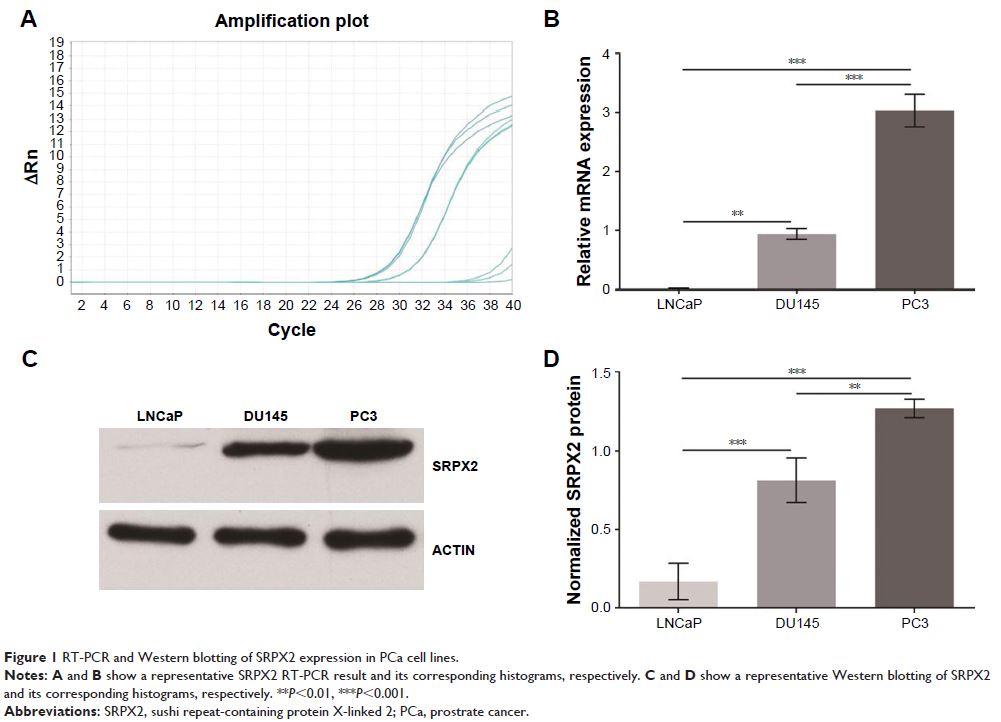108384
论文已发表
注册即可获取德孚的最新动态
IF 收录期刊
- 3.4 Breast Cancer (Dove Med Press)
- 3.2 Clin Epidemiol
- 2.6 Cancer Manag Res
- 2.9 Infect Drug Resist
- 3.7 Clin Interv Aging
- 5.1 Drug Des Dev Ther
- 3.1 Int J Chronic Obstr
- 6.6 Int J Nanomed
- 2.6 Int J Women's Health
- 2.9 Neuropsych Dis Treat
- 2.8 OncoTargets Ther
- 2.0 Patient Prefer Adher
- 2.2 Ther Clin Risk Manag
- 2.5 J Pain Res
- 3.0 Diabet Metab Synd Ob
- 3.2 Psychol Res Behav Ma
- 3.4 Nat Sci Sleep
- 1.8 Pharmgenomics Pers Med
- 2.0 Risk Manag Healthc Policy
- 4.1 J Inflamm Res
- 2.0 Int J Gen Med
- 3.4 J Hepatocell Carcinoma
- 3.0 J Asthma Allergy
- 2.2 Clin Cosmet Investig Dermatol
- 2.4 J Multidiscip Healthc

高 SRPX2 蛋白表达可预测前列腺癌患者的不佳的临床疗效
Authors Zhang M, Li X, Fan Z, Zhao J, Liu S, Zhang M, Li H, Goscinski MA, Fan H, Suo Z
Received 5 December 2017
Accepted for publication 6 February 2018
Published 28 May 2018 Volume 2018:11 Pages 3149—3157
DOI https://doi.org/10.2147/OTT.S158820
Checked for plagiarism Yes
Review by Single-blind
Peer reviewers approved by Dr Cristina Weinberg
Peer reviewer comments 2
Editor who approved publication: Dr Ingrid Espinoza
Background: Sushi repeat-containing protein X-linked 2 (SRPX2) is
overexpressed in a variety of different tumor tissues and correlated with poor
prognosis in patients. Little research focuses on the role of SRPX2 expression
in prostate cancer (PCa), and the clinicopathological significance of the
protein expression in this tumor is relatively unknown. However, our previous
transcriptome data from those cancer stem-like cells indicated the role of SRPX2
in PCa.
Materials and
methods: In this study, RT-PCR and Western
blotting were firstly used to examine the SRPX2 expression in three PCa cell
lines including LNCaP, DU145, and PC3, and then SRPX2 protein expression was
immunohistochemically investigated and statistically analyzed in a series of
106 paraffin-embedded PCa tissue specimens.
Results: Significantly lower levels of SRPX2 expression were verified in
the LNCaP cells, compared with the expression in the aggressive DU145 and PC3
cells, in both mRNA and protein levels. Immunohistochemically, there were
variable SRPX2 protein expressions in the clinical samples. Moreover, high
levels of SRPX2 expression in the PCa tissues were significantly associated
with Gleason score (P =0.008), lymph
node metastasis (P =0.009), and distant metastasis (P =0.021). Furthermore, higher
levels of SRPX2 expression in the PCa tissues were significantly associated
with shorter overall survival (OS) (P <0.001).
Conclusion: Our results demonstrate that SRPX2 is highly expressed in
aggressive PCa cells in vitro, and its protein expression in PCa is
significantly associated with malignant clinical features and shorter OS,
strongly indicating its prognostic value in prostate cancers.
Keywords: SRPX2, immunohistochemistry, prostate cancer
